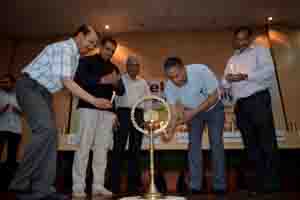July 2019
Celebration of International Tiger Day and Release of report on the Fourth Cycle of Assessment of Tiger and Tiger Reserves in India, 2018
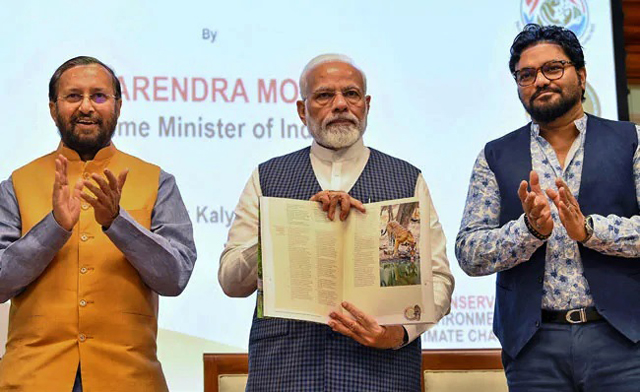 |
|
|
The National Tiger Conservation Authority, Wildlife Institute of India and the Ministry of Environment, Forest and Climate Change, Govt. of India, celebrated the International Tiger Day on 29th July, 2019, at the residence of the Hon'ble Prime Minister of India. During the event, two WII-NTCA reports viz. Fourth Cycle of Tiger Population Estimation, 2018 and Fourth Cycle of Management Effectiveness Evaluation of Tiger Reserve, 2018 were released by Hon'ble Prime Minister of India. Releasing the 4th Cycle of MEE report on all 50 tiger reserves in the country, the Hon’ble Prime Minister of India complimented the National Tiger Conservation Authority, Wildlife Institute of India and the Managers and Frontline Staff for institutionalizing the MEE process in India. India now proudly stands amongst the select group of nations that have successfully demonstrated the significance of adopting an outcome-based approach for tiger conservation. ‘Inspite of all resource constraints, India has been able to manage its tiger reserves effectively as reflected in the mean score of 70% in this assessment and none of the tiger reserve has been ranked in poor category’ said Shri Prakash Javadekar, Hon’ble Minister of Environment, Forest and Climate Change. He urged all managers, scientists and stakeholders engaged in tiger conservation to continue with their efforts to safeguard India’s wilderness resources. Shri C.K. Mishra, Secretary, Ministry of Environment, Forest and Climate Change said that there has been a continuous improvement in the MEE ratings of Tiger Reserves, which started in 2006 and have now completed four successive cycles. |
|
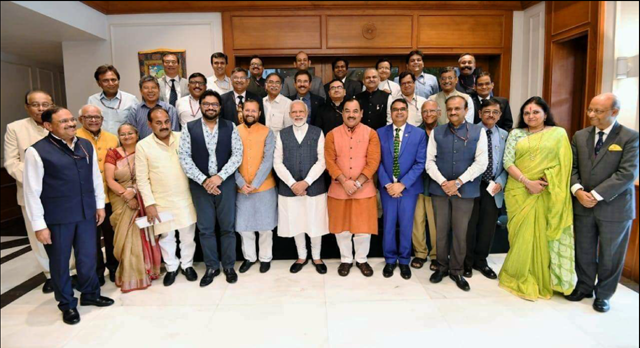 |
|
 |
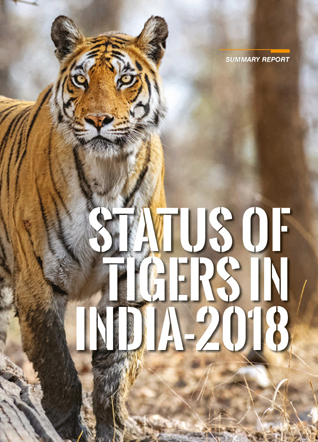 |
Plug-in: Download Adobe Acrobat Reader
Last Updated: August 2, 2019
Capacity Building Programme on Conservation and Management of Natural Capital in Transportation Projects in South Asia at Wildlife Institute of India from 15th-19th July, 2019
<ht
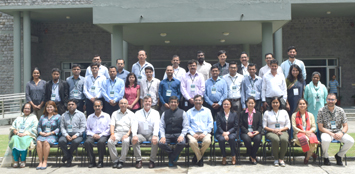 A one-week Asian Development Bank supported training workshop to build capacity for conserving and managing natural capital during the planning and implementation of transportation projects in South Asia was held at WII, Dehradun from 15th July to 19th July, 2019.
A one-week Asian Development Bank supported training workshop to build capacity for conserving and managing natural capital during the planning and implementation of transportation projects in South Asia was held at WII, Dehradun from 15th July to 19th July, 2019.
The key objective of the training workshop was to support the capacity building of individuals and organizations working in the implementation of Green Linear Infrastructure projects in the transportation sector in South Asia.
Transportation infrastructure projects invariably involve considerable amount of land diversion and long-term investments. These projects also have the potential to cause severe impacts to the environment and wildlife. To counter these adverse effects of developments, it is imperative to enhance capacity to address the negative impacts of linear infrastructure projects on biodiversity and harmonize conservation with development goals.
In this context, Asian development Bank has partnered with Wildlife Institute of India (WII) on the project ‘Protecting and Investing in Natural Capital in Asia and the Pacific’. Building capacity to promote ecologically friendly and sustainable road and rail development projects in Asia forms an important component of this project.
Shri. Parveen Pardeshi, Commissioner, Brihanmumbai Municipal Corporation, Mumbai while inaugurating the programme highlighted the need to harmonize conservation concerns with developmental imperatives. Dr V.B. Mathur, Director, WII, emphasised that capacity constraints in planning green transportation projects remain one of the biggest challenges for avoiding and mitigating potential impacts of road, rail and other transport infrastructure across South Asia. He said that the outcome of the programme would help guide responsible development in consonance with conservation of natural capital.
Twenty participants from Bangladesh, Bhutan, India, Nepal and Sri Lanka representing sectoral development agencies for roads and highways, railways as well as from development banks attended this programme.
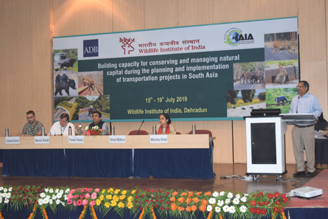 |
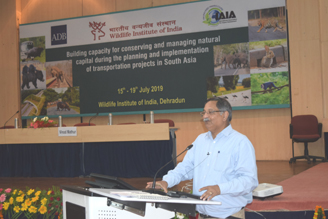 |
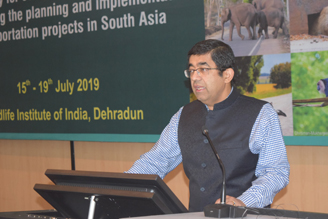 |
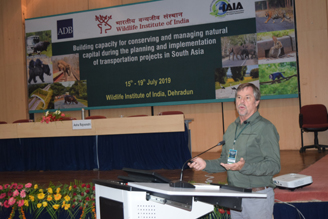 |
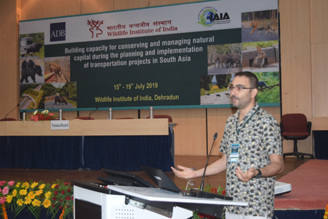 |
 |
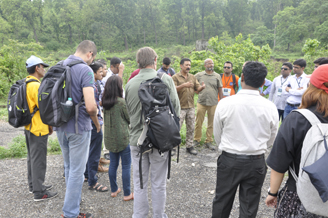 |
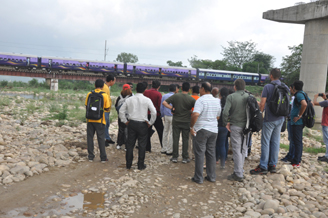 |
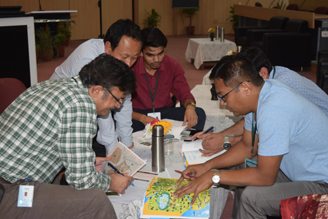 |
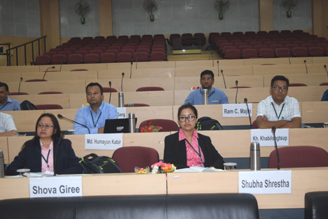 |
 |
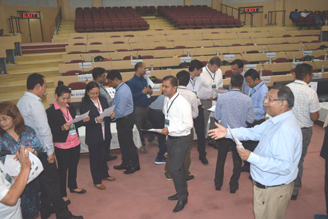 |
Last Updated: July 19, 2019
1st Master’s Course in Heritage Conservation and Management inaugurated at Wildlife Institute of India on 1st July, 2019
|
|
||
|
|
 |
|
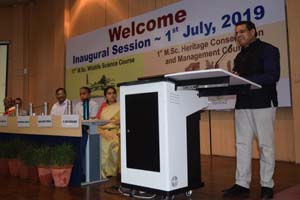 |
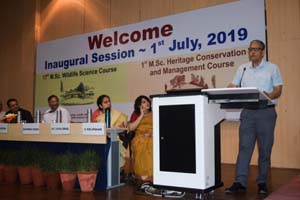 |
|
 |
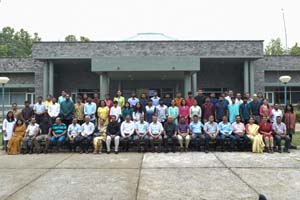 |
|
Last Updated: July 18, 2019

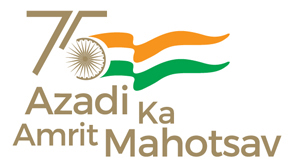
 (309 mb)
(309 mb) The UNESCO Category 2 Centre for World Natural Heritage Management and Training for Asia and the Pacific Region at the Wildlife Institute of India, Dehradun (UNESCO C2C at WII), inaugurated the Master’s Course in Heritage Conservation and Management on 1st July 2019. In an inaugural function, graced by Chief Guest, Dr Nitin Kumar Pethani, Vice Chancellor of Saurashtra University, and Guests of Honour, Dr G.C. Bhimani, Saurashtra University, and Dr Ravindra Singh, Former Secretary, Ministry of Culture, the first batch of students were ushered in. In his welcome address, Dr G.S. Rawat, Dean, Faculty of Wildlife Science, WII, expressed his pleasure that ten enthusiastic, motivated students from diverse backgrounds have been selected for this course (see profile: link
The UNESCO Category 2 Centre for World Natural Heritage Management and Training for Asia and the Pacific Region at the Wildlife Institute of India, Dehradun (UNESCO C2C at WII), inaugurated the Master’s Course in Heritage Conservation and Management on 1st July 2019. In an inaugural function, graced by Chief Guest, Dr Nitin Kumar Pethani, Vice Chancellor of Saurashtra University, and Guests of Honour, Dr G.C. Bhimani, Saurashtra University, and Dr Ravindra Singh, Former Secretary, Ministry of Culture, the first batch of students were ushered in. In his welcome address, Dr G.S. Rawat, Dean, Faculty of Wildlife Science, WII, expressed his pleasure that ten enthusiastic, motivated students from diverse backgrounds have been selected for this course (see profile: link 